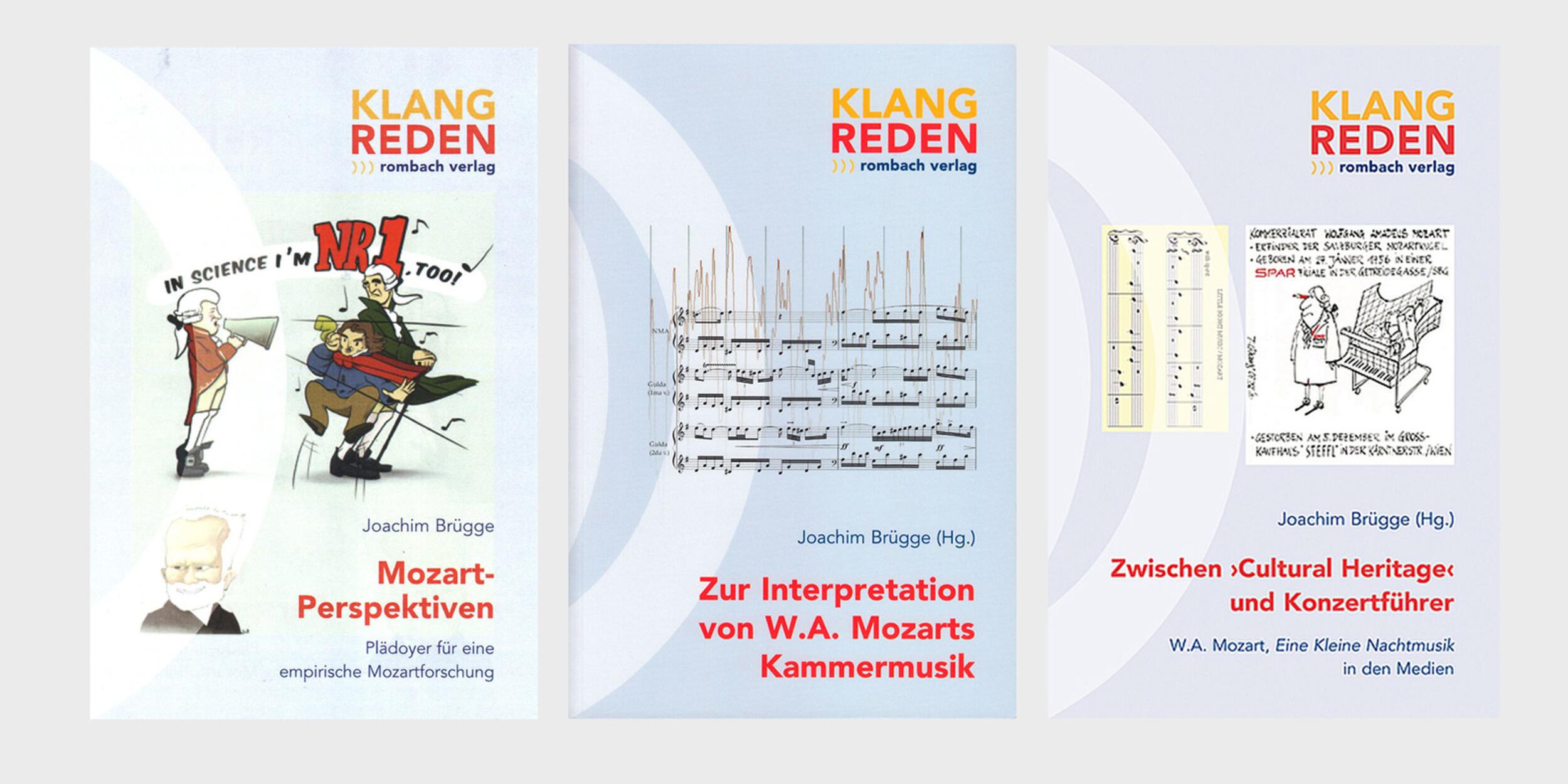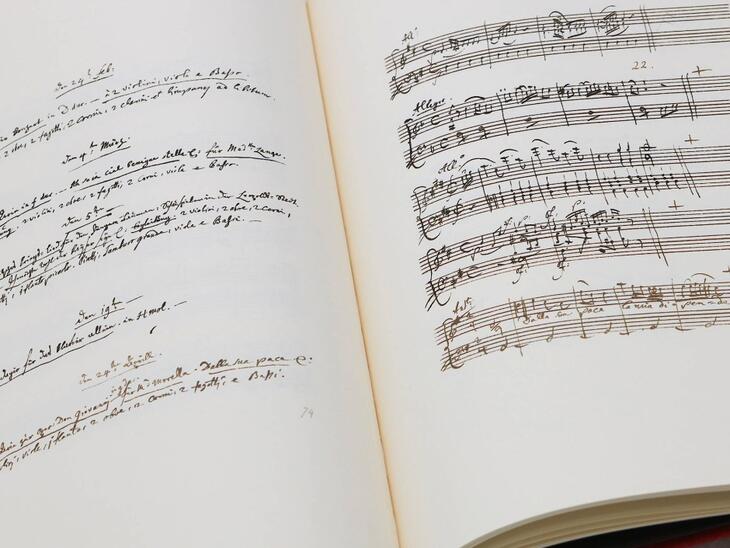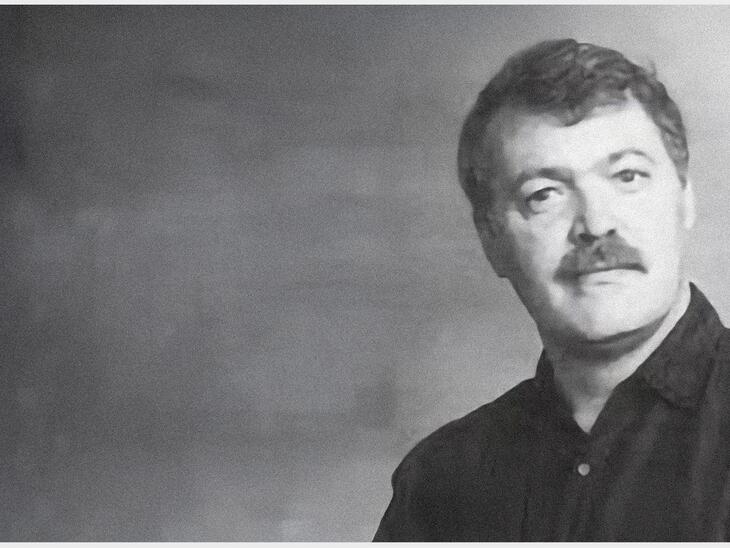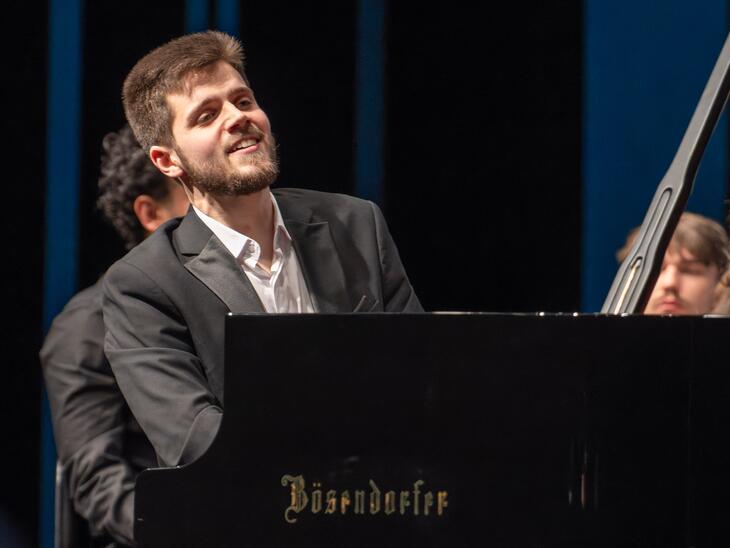mozart research and no end in sight …
11.12.2021
News

The latest volume in the publication series "klang-reden" by the Institute for the History of Musical Reception and Interpretation is a plea for empirical repertoire research - and opens up new perspectives on Mozart.
The publication series "klang-reden" has so far published 25 volumes on numerous topics, including seven volumes dealing with Mozart.
The study of music at the end of the 18th and beginning of the 19th century ("Viennese Classicism") is increasingly becoming a discontinued model in current musicology. In the context of the two major Mozart anniversaries of 1991 and 2006, for example, isolated reviews reported that Mozart research as a whole had "run out of steam" and that Mozart had become obsolete as a scholarly subject. This assessment can also be applied to the classical repertoire of 19th century music and reflects a clear generational change in the subject of musicology. Of course, musicology at an art university cannot fully support such a development - and an art university Mozarteum certainly not: students from more than 80 nations want to study at the University Mozarteum Salzburg also because it stands for a diverse musical practice in which the music of Viennese Classicism is played, heard and taught. An art-university musicology cannot afford to consciously distance itself from this core repertoire, which is also professionally relevant. Against this background, it was a sub-project of the Institute for the History of Musical Reception and Interpretation (IMRI) at the Mozarteum University in Salzburg to demonstrate the topicality of Mozart research for the fields of reception, interpretation and analysis in interweaving with current questions of the philosophy of science. The institute's series "klang-reden" has produced seven volumes to date. Above all, the study of the history of interpretation is an essential aspect of modern Mozart research - a question that is also of particular concern to students: How was and is Mozart's music performed? Which aesthetic and interpretive aspects are possibly also important for my own playing? Despite individual works since the 1950s, interpretive research is still a young discipline in the field of musicology and is currently particularly concerned with finding a method. In addition to the first volume, "Mozart's Last Three Symphonies," the volume "On the Interpretation of W.A. Mozart's Chamber Music" provides model studies on selected methodological aspects of interpretive research on Mozart - with contributions by Bernadeta Czapraga and Rainer J. Schwob, who, along with Alexander Drčar as permanent members of IMRI, represent the next generation of future Mozart research. Reception research, on the other hand, is an established area of Mozart research with a long tradition of research. It can probably be stated without exaggeration that Mozart has the most complex reception history of composers in the 18th and 19th centuries. This is also shown by the volume "Herausforderung Mozarts" on the compositional reception history as well as Mozart's famous "Kleine Nachtmusik", KV 525, which despite a worldwide reception still shows numerous biographical and reception-aesthetic gaps. This is illuminated by the volume "Between 'Cultural Heritage' and Concert Guide," which also addresses methodological questions of modern reception research. Probably the central contribution comes from the leading discologist in German-language musicology, Martin Elste, who in a detailed, over 60-page study "From the Shellac Record to the Ringtone Chip" has written a discological thriller about how the "Kleine Nachtmusik" came to be recorded on vinyl and other media. For musicology at the University Mozarteum Salzburg, it is a matter of course to participate in current issues and theories of other disciplines and also to situate them critically. The volume "Intertextualität und Rezeptionsgeschichte?" (Intertextuality and the History of Reception?) is an exemplary discussion of intertextuality theory. In addition to a 70-page critical synopsis on the applicability of intertextual categories to musical phenomena, the volume uses Mozart's "Divertimento in E-flat Major," KV 563, as a case study to concretely examine intertextuality. It is interesting to note that Mozart was one of the first, if not the first, composer in European music history for whom one can actually speak of intertextuality as an auctorial category. The attempt to establish Salzburg as a location for Mozart research is also reflected in the long-standing collaboration with the Mozarteum Foundation, there especially with the Mozart Sound and Film Collection. The anniversary volume "Both Mozart and ¼", published in 2016 on the occasion of the 25th anniversary of the sound and film collection and 10 years of IMRI, documents this with selected questions on Mozart's reception and interpretation research. The fact that Mozart research is currently far from having reached its end is also shown by the last volume in the series, "Mozart Perspectives," whose subtitle "Plea for Empirical Repertoire Research" sets the tone: Mozart's music, with its many facets of musical as well as contextual plurality, is more topical than ever. This is conveyed in books by the French filmmaker Eric Rohmer, "From Mozart to Beethoven" (Paris 1996) as well as in the remarkable film adaptation of "The Magic Flute" by Sir Kenneth Branagh (2006). In view of current social upheavals in the context of the recent crises, the music of Mozart and that of the Viennese Classical period stands above all for one thing - namely the idea of a European Enlightenment. Salzburg, which is located in the center of Europe, demands this in an almost geographically ideal way. (First published in the Uni-Nachrichten / Salzburger Nachrichten on December 11, 2021)
sound speeches
Joachim Brügge, Wolfgang Gratzer, Thomas Hochradner [Hg.]
Rombach Verlag, Freiburg i. Br. 2008 | klang-reden 1
Music
Wolfgang Gratzer [Hg.]
Rombach Verlag, Freiburg i. Br. 2008 | klang-reden 2
Music
Joachim Brügge [Hg.]
Rombach Verlag, Freiburg i. Br. 2014 | klang-reden 12
Music
Joachim Brügge [Hg.]
Rombach Verlag, Freiburg i. Br. 2015 | klang-reden 14
Music
Joachim Brügge [Hg.]
Rombach Verlag, Freiburg i. Br. 2016 | klang-reden 15
Music
Joachim Brügge [Hg.]
Rombach Verlag, Freiburg i. Br. 2017 | klang-reden 18
Music
Joachim Brügge
Rombach Wissenschaft / Nomos, Baden-Baden 2021 | klang-reden 25
Music



